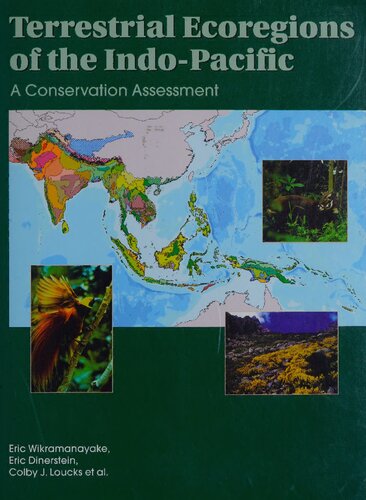

Most ebook files are in PDF format, so you can easily read them using various software such as Foxit Reader or directly on the Google Chrome browser.
Some ebook files are released by publishers in other formats such as .awz, .mobi, .epub, .fb2, etc. You may need to install specific software to read these formats on mobile/PC, such as Calibre.
Please read the tutorial at this link. https://ebooknice.com/page/post?id=faq
We offer FREE conversion to the popular formats you request; however, this may take some time. Therefore, right after payment, please email us, and we will try to provide the service as quickly as possible.
For some exceptional file formats or broken links (if any), please refrain from opening any disputes. Instead, email us first, and we will try to assist within a maximum of 6 hours.
EbookNice Team

Status:
Available0.0
0 reviewsThis book, along with its companions in this series, takes an ecoregional approach, dividing large regions into small, distinct units, each with its characteristic species, ecosystems, natural history, and threats. As such, it has no peers. It is the sourcebook for anyone who must look for where and how to act to save the variety of life on Earth." --from the foreword by Stuart L. Pimm
A number of conservation groups, including World Wildlife Fund, have in recent years adopted an approach to conservation that uses ecoregions to identify biological and conservation priority areas. Ecoregions define distinct ecosystems that share broadly similar environmental conditions and natural communities; as such, they make more sense for priority-setting efforts than do political units such as countries or provinces.
Terrestrial Ecoregions of the Indo-Pacific offers a comprehensive examination of the state of the Indo-Pacific's biodiversity and habitats, moving beyond endangered or charismatic species to quantify for the first time the number of mammal and bird species, including endemics, in each ecoregion.
The book begins w
ith a discussion of
the background and basis for ecoregion delineation and definition of the objectives and approach used. Following that, chapters describe the biological distinctiveness and conservation status of ecoregions, quantifying the amount of habitat remaining, how it is distributed, and how much is protected. The analysis concludes with a set of ecoregions that deserve immediate attention and also highlights ecoregions that are still in relatively pristine condition. Substantial appendixes offer detailed descriptions of each ecoregion, including information on:
Delay in Rendering